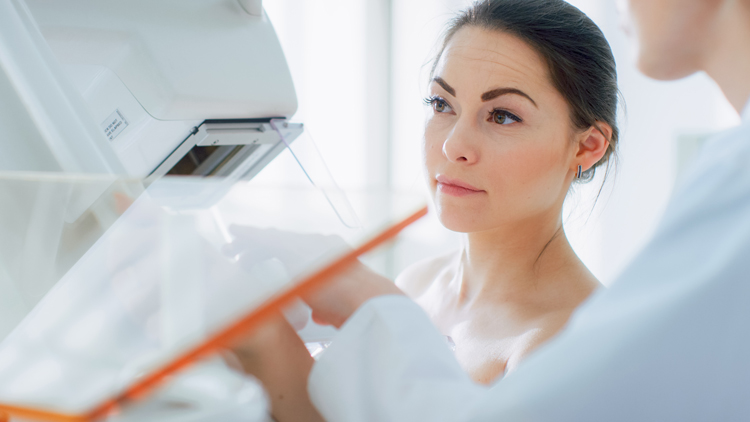
When women come to us for hormone balancing therapy, we are often asked about HRT and breast cancer risk – it’s definitely a concern in the back of most women’s minds.
The relationship between HRT and breast cancer risk has often been sensationalised by the media and is misunderstood by many. Just how worried should we be? In this blog post we look at recent advances in assessing breast cancer risk and aim to answer those burning questions you may have.
Dr Ghazala Aziz-Scott, Consultant at the Marion Gluck Clinic, explains: “We want to reassure women that recent advances mean that there are ways we can assess an individual’s risk of breast cancer in a clear, scientific way. Women contemplating starting HRT are often in conflict with their desire for menopausal symptom relief, the documented long-term health benefits of HRT such as cardiovascular, bone and brain health versus fear of cancer. However, by helping individuals to understand the risk(s), we hope to empower women to feel confident about what options they have and in any decision they make.”
HRT and breast cancer – should we be concerned?
Should we be concerned about the link between HRT and breast cancer? We take a look at the facts. In September 2019 The Lancet, a highly respected journal, reviewed 58 published and unpublished studies (the majority of which use conventional HRT in the form of oral synthetic estrogens and progestins) from between 1992-2018 and concluded that:
- If a woman aged 50 takes combined HRT and is followed up 20 years later, the breast cancer risk goes up from 6.3% to 8.3% (a 2% increase). HRT increases breast cancer risk by 2%.
- In the same scenario on estrogen-only therapy, the risk goes up from 6.3% to 6.8% (a 0.5% increase). Estrogen-only HRT increases breast cancer risk by 0.5%.
However, in their review, the Lancet did not include licensed bioidentical (also known as body identical) HRT formulations containing micronised natural progesterone. Natural progesterone is used in the customised BHRT that we prescribe in a range of formulations. Read our full statement in response to the Lancet review.
And what about bioidentical hormones? We fully support that more large-scale studies need to be carried out on the impact of BHRT and breast cancer. However, the small-scale studies that have been carried out show:
- Some studies have shown the breast cancer risk to be lower in women using the bioidentical form of progesterone. Natural progesterone inhibits estrogen stimulated breast epithelial cells and down regulates estrogen alpha receptors in breast tissue. It may even arrest human cancer cells.
- Evidence shows that if you used transdermal natural estrogen and oral micronised progesterone the risk of breast cancer after 5 years is the same as the baseline (6.3%). There is limited evidence that estrogens combined with oral micronised progesterone for greater than 5 years has an increased breast cancer risk.
What Is It About HRT That Increases Risk Of Breast Cancer?
Women are often concerned that hormone replacement therapy itself is the cause of breast cancer but this is not the case. It’s how the estrogen is metabolised in the body, and an accumulation of estrogen that increases one’s risk.
To put it simply, every individual metabolises estrogen in the body by detoxification processes in the liver and then excretion via the urine and stool. How each individual metabolises estrogen can vary due to genetic and lifestyle factors. When estrogen is broken down, it gets turned into metabolites. Some of these are considered to be ‘good’ or protective (2-hydroxyestrone) and others ‘bad’ or toxic (4-hydroxyestrone and 16-hydroxyestrone). This is because research shows that women with more of the ‘bad’ metabolites have a higher risk of breast cancer than women with more of the ‘good’ metabolites. 4-hydroxyestrone can bind to and damage DNA if overproduced or not adequately detoxed in the liver.
It’s essential that the body excretes the estrogen metabolites effectively to prevent an accumulation of estrogen in the body. If the body doesn’t excrete the estrogen metabolites efficiently, they are absorbed back into the bloodstream, resulting in a build-up of estrogen (estrogen dominance), which can increase breast cancer risk and can have a negative impact on health. Genetic variations can cause some women to produce higher levels of estrogen and its metabolites and this can also cause estrogen dominance.
The body’s ability to excrete these estrogen metabolites from the body can be influenced by a multitude of factors. It is this build-up of estrogen (and the ‘bad’ metabolites) that increases risk of breast cancer, rather than HRT itself.

Other Breast Cancer Risk Factors
Breast cancer risk is complex and your individual breast cancer risk may be influenced by a number of factors including:
- Age: The risk of developing breast cancer increases with age and is most common in women over 50. In fact, 80% of breast cancers occur in women aged 50 or older.
- Genetics: Genetics play a role in risk, for example, family history of breast cancer; the BRCA1 and BRCA2 gene mutations increase risk of breast cancer up to 80%.
- Reproductive history: Women who take the pill have a slightly increased risk of breast cancer, but breastfeeding for more than 6 months lowers the risk of developing breast cancer.
- Radiation history: Repeated CT scans, as well as radiotherapy can increase your risk.
- Lifestyle factors: Smoking, alcohol consumption, and physical activity can influence risk (physically active women have a much lower risk than inactive women). Obesity is also a strong risk factor for developing breast cancer.
- Xenoestrogens: Exposure to chemicals in the environment that disrupt normal estrogen balance, for example in plastics.
This diagram from the British Menopause Society can be useful in helping to understand the lifestyle risk factors versus HRT treatment.
At the Marion Gluck Clinic, we consider all these factors when tailoring any treatment plan for your peace of mind.
Assessing Your Breast Cancer Risk With BHRT
We will always consider your family and reproductive history, medical history and lifestyle during any consultations but if you are concerned about breast cancer risk, we can carry out additional testing to get a detailed picture of your individual risk.
DUTCH test (Dried Urine Test for Comprehensive Hormones): At the Marion Gluck Clinic, we can evaluate how your body produces estrogen, breaks it down in various biochemical pathways and clears it from the body using the DUTCH urine test. This analyses the sex and adrenal hormones and their metabolites to give a unique overview of metabolic health, and can give a clear indication of the proportions of ‘good’ metabolites vs the ‘bad’ metabolites of estrogen in the body.
Genomics testing: This is a form of DNA testing which involves taking a swab from inside the cheek and profiles genes involved in sex hormone production and metabolism. Every individual has variations in their genes called SNPs or single nucleotide polymorphisms, and some of these – more specifically, genes that code the different proteins that are involved in estrogen synthesis and metabolism – can help identify women with a higher lifetime exposure to estrogens, estrogen metabolites and other carcinogens which increases breast cancer risk.
“Being aware of an individual’s genetic variability allows us to understand where your personal vulnerabilities lie. We can then make recommendations based on your individual risk, and on how to potentially improve estrogen metabolism through targeted diet, lifestyle, and hormone interventions. Nutrition and lifestyle are often brushed aside as being of little consequence, but are both powerful tools for downregulating or upregulating the enzymes involved in the estrogen and sex hormone pathways. With this in mind, it’s really important to take an integrative approach and combine these with any hormone balancing therapy.” explains Dr Aziz-Scott.
Our Top Estrogen Modulating & Cancer-protective Nutrients
Gut dysbiosis is an imbalance of the gut bacteria in the gastrointestinal tract, which is very common. Poor gut health can cause inactivated estrogen metabolites to become reabsorbed back into the blood, leading to an increase in estrogen levels and in turn influencing breast cancer risk. Our top tips include:
- Eat clean and organic where possible.
- High fibre foods and wholegrains which promote gut motility and encourage elimination of estrogen via the bowel.
- Opt for a low GI diet with lots of phytonutrients which are important for detoxification of estrogen in the liver.
- Avoid dairy which can contain traces of estrogens.
- Steer clear of alcohol which affects the detox pathways in the liver.
- Get a good range of nutrients in your diet including: Omega 3, magnesium, zinc, selenium, and the whole range of B vitamins.
- Eat plenty of cruciferous vegetables as they stimulate enzymes that help to lower estrogen and help form the ‘good’ metabolites.
- DIM is a supplement that can push the good estrogen pathways.
- Calcium d glucarate can decrease the reabsorption of estrogen in the gut.
- Incorporate ginger, garlic and curcumin into your diet for their inflammation reducing properties.
- Green tea contains catechins which are polyphenols important in detoxification.
You can read more about how the gut influences hormone balance here.
Can I Have Hormone Balancing Therapy If I Have A Family History Of Breast Cancer?
The answer is yes. We have patients with a family history of breast cancer – and even some who have had it – and chose to have hormone balancing therapy due to the improved quality of life and long-term health benefits.
At the Marion Gluck Clinic, we always take the safety of our patients extremely seriously and discuss all risk factors, taking into account family history, lifestyle and the impact any health concerns have had on them both physically and psychologically.
Because we prescribe customised BHRT, the dose is always the lowest possible to give optimal symptom control. We also constantly monitor patients throughout their treatment, ensuring up-to-date breast cancer screening (mammograms), DEXA scans (to check bone density), pelvic ultrasounds and blood tests to ensure the best outcomes.
Speak To One Of Our Hormone Doctors



